#daoism
Text

There are types of heavenly realms inhabited by beings full of strength and energy, endowed with many powers, but somewhat "eccentric". These we call the realms of the Yin Deities, a kind of world of demons, beings endowed with consciousness, intelligence and powers far superior to those of humans. They are the antithesis of the Yang Deities and are just as powerful. They move between universes and live for hundreds of millions of years. They also come down and make their incursions here.
The Yin Deities inhabit a much more powerful world above our own. Powerful, they sometimes fight battles and wars between themselves and against the Yang Deities.
#taoism#daoism#taoist#daoist#demon#demonic#spirituality#mysticism#occult#occultism#left hand path#magick#satanic#satanism#satanist#satan#yao guai#yokai#kuei#esoteric#japonese yokai#chinese culture#chinese folklore#magic
22 notes
·
View notes
Text
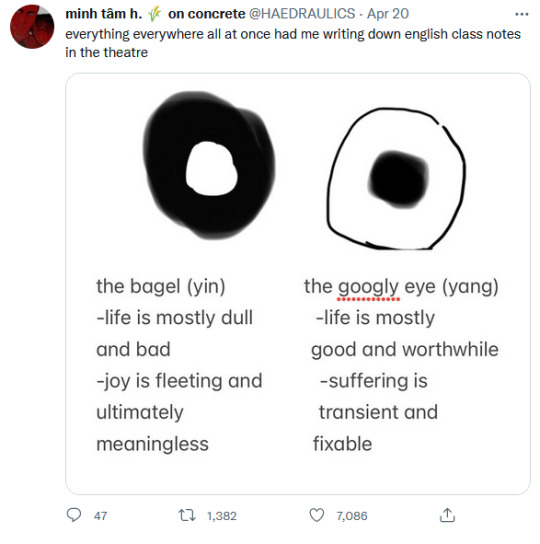
[IMAGE ID: A tweet by “minh tâm h. 🌾 on concrete” @HAEDRAULICS on Apr 20: “everything everywhere all at once had me writing down english class notes in the theatre” with two drawings of sets of two nested circles, one black with a white center, one white with a black center. They are respectively labeled, “the bagel (yin) // -life is mostly dull and bad // -joy is fleeting and ultimately meaningless” and, “the googly eye (yang) // -life is mostly good and worthwhile // suffering is transient and fixable” END ID]
#everything everywhere all at once#eeaao#daniels#@haedraulics#on twitter#daoism#taoism#theology#one only pulls inward one only sees outward neither is alone a complete life
44K notes
·
View notes
Quote
Achieve results, but never glory in them. Achieve results, but never boast. Achieve results, but never be proud.
Laozi, Daodejing, Feng & English tr. (Ch 30)
681 notes
·
View notes
Text
BY 换谁不迷糊呀 (fyi, don't try chinese daoism 手印shouyin/指诀zhijue in a bold manner because↓
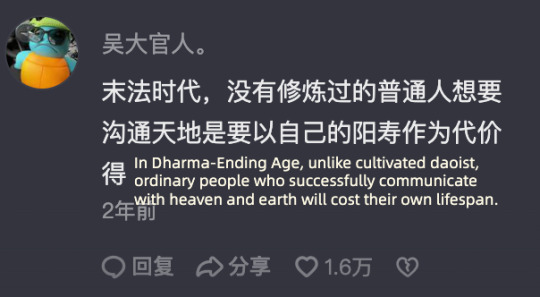

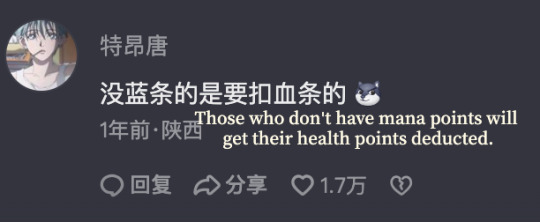
#china#video#fun#shouyin#zhijue#the practice of making a shouyin is called 结印jieyin#chinese culture#daoism#i think he is half in jest because of that doge emoji(is he?#so don't worry it probably will just cost you two years#not twenty
1K notes
·
View notes
Text
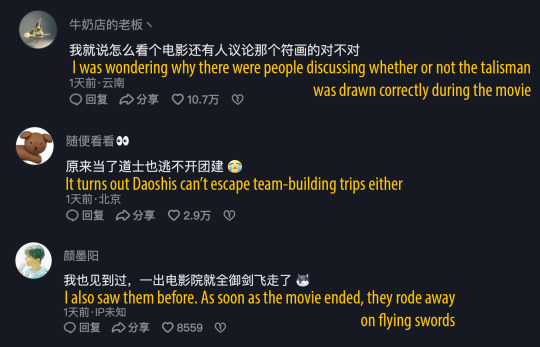
English added by me :)
1K notes
·
View notes
Text
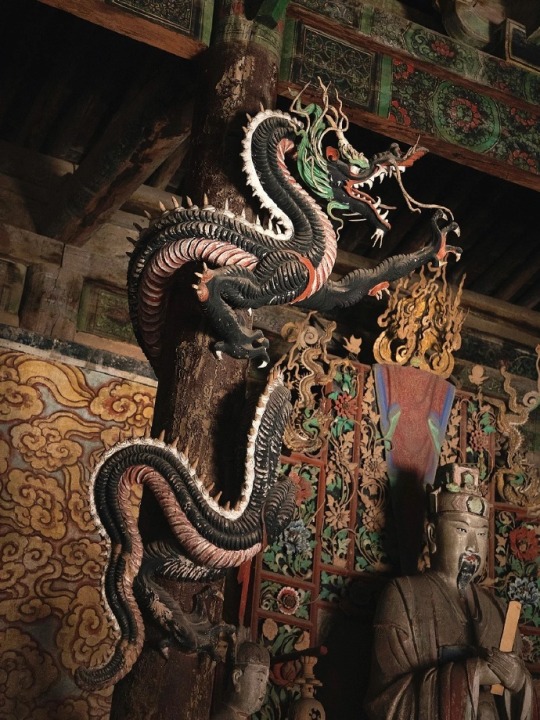
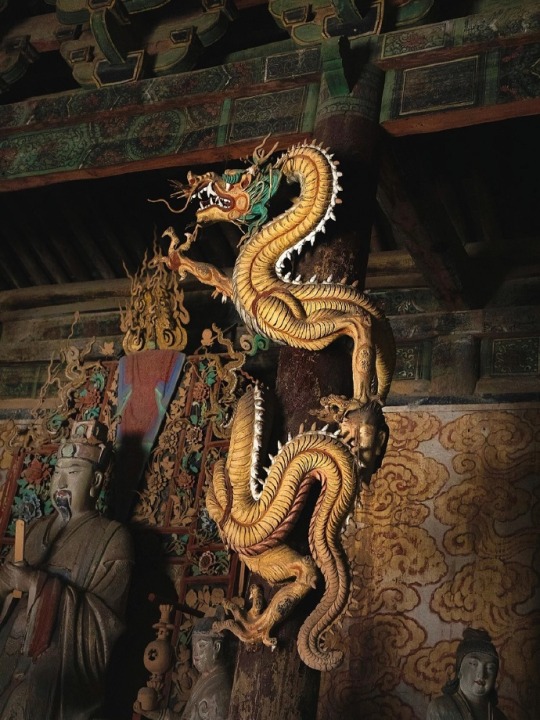
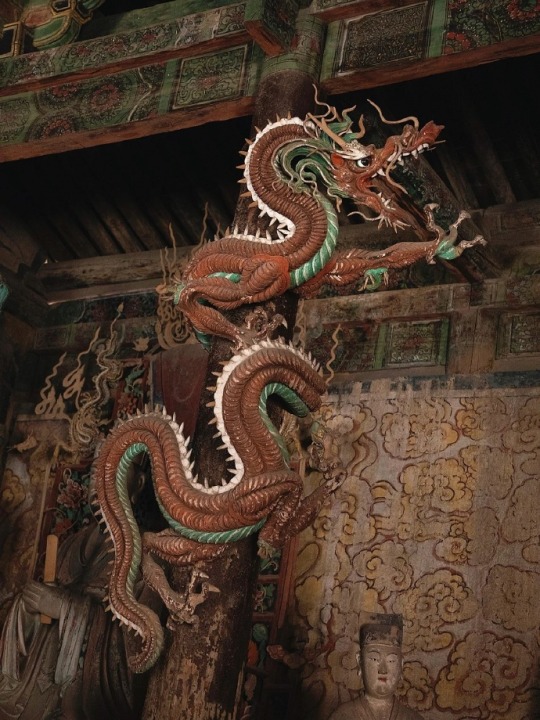
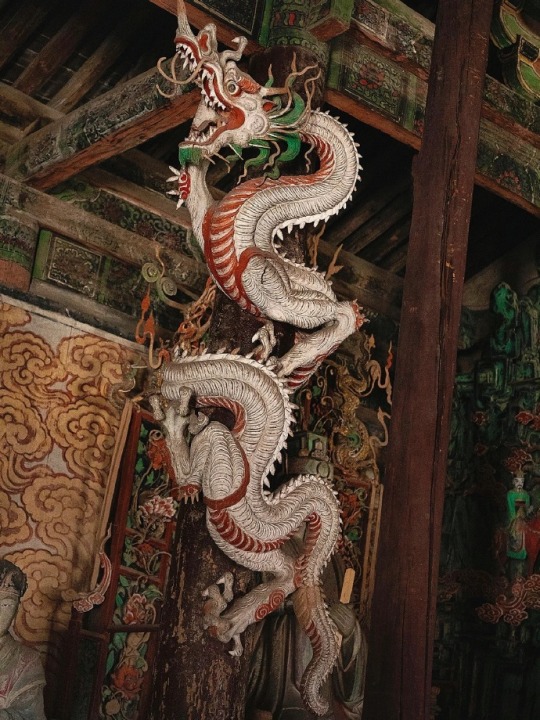

Mythological Realism: Elemental Dragons
Four-color coiled dragons on the pillars of the Supreme Talisman (Taifu) Temple (太符觀).
The dragons are painted in the colors of the primary elements, embodying the archetypal creative forces. In Chinese religious art, almost any concept can be expressed in the language of dragons.) Their children, descendants and relatives frolic on the temple walls among curly clouds.
In view of the striking liveliness, I would classify these images as mythological realism.)
Since its construction in the fifth year of the Jin dynasty (1200), the temple has been repeatedly expanded and supplemented with new buildings over the centuries. Most of the surviving statues are from the Ming dynasty.
The Supreme Talisman Temple is located in Fenyang (汾陽), Shanxi.
Photo: ©故尔耳
#ancient china#chinese culture#chinese art#chinese mythology#ming dynasty#taoist practices#religious art#chinese temple#Taoist temple#taoism#taoist#statue#sculptures#statues#daoism#jin dynasty#dragon#dragons#dragon art#creatures#wood carving#woodworking#temple architecture#wooden architecture#wooden buildings#chinese architecture
367 notes
·
View notes
Text

265 notes
·
View notes
Note
I've heard the idea that Monkey is 7 times immortal thrown around a couple times, but my count has only ever gone up to 4 (the peaches, the pills, the wine, and his daoist studies). How immortal IS Monkey?
I count at least six levels of immortality.
1) Daoist Longevity Arts - Ch. 2
I discuss the exact methods here.
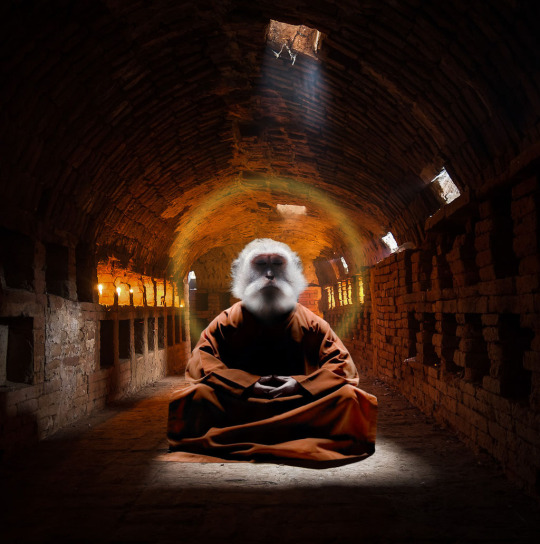
A photomanipulation by me.
2) Erasing Allotted Lifespan - Ch. 3
[After Monkey is summoned to hell in his sleep and thereafter threatens to beat the Judges of Hell for their mistake] The Ten Kings immediately had the judge in charge of the records bring out his [Sun's] books for examination. The judge, who did not dare tarry, hastened into a side room and brought out five or six books of documents and the ledgers on the tens species of living beings ... He [Monkey] had, therefore, a separate ledger, which Wukong examined himself. Under the heading "Soul 1350" he found the name Sun Wukong recorded, with the description: "Heaven-born Stone Monkey. Age: three hundred and forty-two years. A good end."
Wukong said, "I really don't remember my age. All I want is to erase my name. Bring me a brush." The judge hurriedly fetched the brush and soaked it in heavy ink. Wukong took the ledger on monkeys and crossed out all the names he could find in it. Throwing down the ledger, he said, "That ends the account! That ends the account! Now I'm truly not your subject" (Wu & Yu, 2012, vol. 1, pp. 140-141).

A print from the Japanese children book Son Goku (1939).
3) Immortal Peaches - Ch. 5
[After being appointed the guardian of the Queen Mother of the West's immortal peach groves] The Great Sage ... asked the local spirit, "How many trees are there?" "There are three thousand six hundred," said the local spirit. "In the front are one thousand two hundred trees with little flowers and small fruits. These ripen once every three thousand years, and after one taste of them a man will become an immortal enlightened in the Way, with healthy limbs and a lightweight body. In the middle are one thousand two hundred trees of layered flowers and sweet fruits. They ripen once every six thousand years. If a man eats them, he will ascend to Heaven with the mist and never grow old. At the back are one thousand two hundred trees with fruits of purple veins and pale yellow pits. These ripen once every nine thousand years and, if eaten, will make a man's age equal to that of Heaven and Earth, the sun and the moon..."
One day he [Monkey] saw that more than half of the peaches on the branches of the older trees had ripened, and he wanted very much to eat one and sample its novel taste. Closely followed, however, by the local spirit of the garden, the stewards, and the divine attendants of the Equal to Heaven Residence, he found it inconvenient to do so. He therefore devised a plan on the spur of the moment and said to them, "Why don't you all wait for me outside and let me rest a while in this arbor?" The various immortals withdrew accordingly. That Monkey King then took off his cap and robe and climbed up into a big tree. He selected the large peaches that were thoroughly ripened and, plucking many of them, ate to his heart's content right on the branches. Only after he had his fill did he jump down from the tree. Pinning back his cap and donning his robe, he called for his train of followers to return to the residence. After two or three days, he used the same device to steal peaches to gratify himself once again
One day the Lady Queen Mother decided to open wide her treasure chamber and to give a banquet for the Grand Festival of Immortal Peaches, which was to be held in the Palace of the Jasper Pool. She ordered the various Immortal Maidens ... to go with their flower baskets to the Garden of Immortal Peaches and pick the fruits for the festival ... [After meeting with the Great Sage's ministers] The local spirit went into the garden with them; they found their way to the arbor but saw no one. Only the cap and the robe were left in the arbor, but there was no person to be seen. The Great Sage, you see, had played for a while and eaten a number of peaches. He had then changed himself into a figure only two inches high and, perching on the branch of a large tree, had fallen asleep under the cover of thick leaves (Wu & Yu, 2012, vol. 1, pp. 161-162).
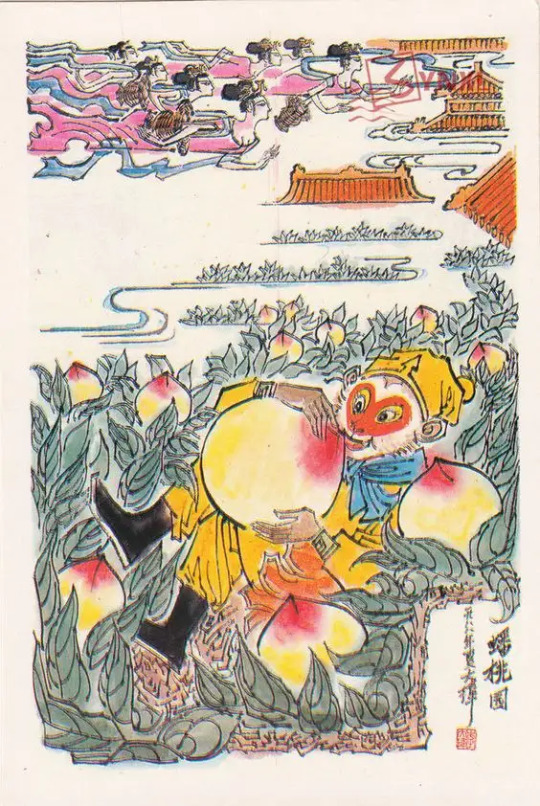
A new years print found online.
4) Immortal Wine - Ch. 5
Our Great Sage could not make an end of staring at the scene [the heavenly feast set for the Immortal Peach Banquet] when he suddenly felt the overpowering aroma of wine ... standing beside the jars and leaning on the barrels, he abandoned himself to drinking. After feasting for a long, he became thoroughly drunk...
[...]
[After returning to Flower Fruit Mountain and meeting with his children, he says] "When I was enjoying myself this morning at the Jasper Pool, I saw many jars and jugs in the corridor full of the juices of jade [yuye qiongjiang, 玉液瓊漿; lit: "Jade liquid and jade syrup"], which you have never savored. Let me go back [to heaven] and steal a few bottles to bring down here. Just drink half a cup, and each of you will live longer without growing old" ... He took two large bottles, one under each arm, and carried two more in his hands. Reversing the direction of his cloud, he returned to the monkeys in the cave. They held their own Festival of Immortal Wine [Xianjiu hui, 仙酒會], with each one drinking a few cups" (Wu & Yu, 2012, vol. 1, pp. 165 and 167).

A screenshot from the 1986 Journey to the West TV show.
5) Immortal Elixir - Ch. 5
[After Sun Wukong drunkenly stumbles into Laozi's laboratory in the Tushita Heaven] He found no one but saw fire burning in an oven beside the hearth, and around the oven were five gourds in which finished elixir was stored. "This thing is the greatest treasure of immortals," said the Great Sage happily. "Since old Monkey has understood the Way and comprehended the mystery of the Internal's identity with the External, I have also wanted to produce some golden elixir on my own to benefit people. While I have been too busy at other times even to think about going home to enjoy myself, good fortune has met me at the door today and presented me with this! As long as Laozi is not around, I'll take a few tablets and try the taste of something new." He poured out the contents of all the gourds and ate them like fried beans (Wu & Yu, 2012, vol. 1, p. 166).
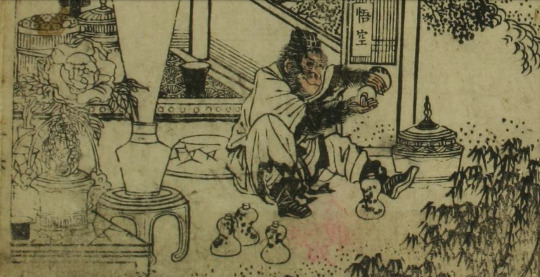
A detail from the 1835 Japanese translation of Journey to the West.
6) Ginseng Tree Fruit - Ch. 24
In the mountain there was a Daoist Abbey called the Five Villages Abbey [Wu zhuang guan, 五莊觀]; it was the abode of an immortal whose Daoist style [name] was Master Shenyuan [Shenyuan zi, 鎮元子] and whose nickname was Lord, Equal to Earth [Shi tong jun, 世同君]. There was, moreover, a strange treasure grown in this temple, a spiritual root that was formed just after chaos had been parted and the nebula had been established prior to the division of Heave and Earth. Throughout the four great continents of the world, it could be found in only the Five Villages Abbey in the West Aparagodaniya Continent. This treasure was called grass of the reverted cinnabar [cao huan dan, 草還丹], or the ginseng fruit [renshen guo, 人參果]. It took three thousand years for the plant to bloom, another three thousand years to bear fruit, and still another three thousand years before they ripened. All in all, it would be nearly ten thousand years before they could be eaten, and even after such a long time, there would be only thirty such fruits. The shape of the fruit was exactly that of a newborn infant not yet three days old, complete with the four limbs and the five senses. If a man had the good fortune of even smelling the fruit, he would live for three hundred and sixty years; if he ate one he would reach his forty-seven thousandth year.
[After Wukong learns the complicated method of harvesting the fruit] Parting the leaves and branches, he knocked three of the fruits into the sack ... The three of them [Monkey and his brothers] took the fruits and began to enjoy them (Wu & Yu, 2012, vol. 1, pp. 453 and 462-463).

Monkey holding ginseng tree fruit. Image found online.
This previous article talks about the history of this magical fruit.
An important note
Sun Wukong is not really immortal, just long-lived and hard to kill. Immortality in Ming to Qing-era popular literature means that you can live for a long time but still die if injured badly enough. Think of it like an infinitely long candle being blown out instead of having a chance to burn for centuries or eons. For example, Investiture of the Gods (Fengshen yanyi, 封神演義, c. 1620), a sort of prequel to Journey to the West, is full of immortals killed in battle with heavenly weapons. Some even have their immortality sapped away before dying in one of many celestial traps. The biggest of these traps is the "Ten Thousand Immortal Array" (Wanxian zhen, 萬仙陣), so named because it can apparently kill myriad transcendents.
I commonly suggest that Monkey's levels of immortality just make him more durable than your average celestial.
Source:
Wu, C., & Yu, A. C. (2012). The Journey to the West (Vols. 1-4) (Rev. ed.). Chicago, Illinois: University of Chicago Press.
#sun wukong#monkey king#journey to the west#Chinese immortal#immortality#Chinese literature#Daoism#Taoism#Buddhism#fengshen yanyi#elixir#lego monkie kid#LMK
149 notes
·
View notes
Text

THE DAO THAT CAN BE DESCRIBED IS NOT THE ETERNAL DAO😂😂😂
THE NAME THAT CAN BE SPOKEN IS NOT THE ETERNAL NAME🤣🤣🤣
994 notes
·
View notes
Text
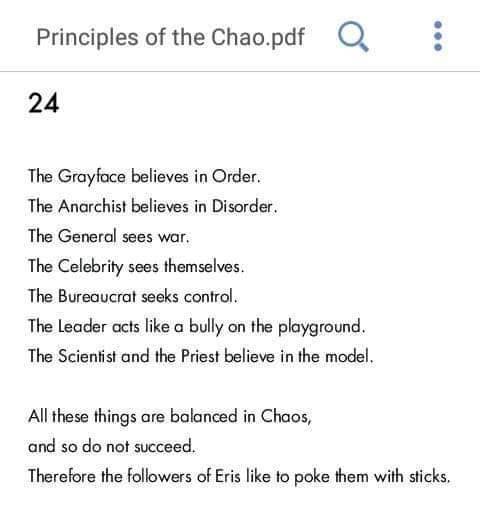
"Many attempts have been made to describe Discordianism. Many attempts have failed. Discordianism is a philosophy some have described it as like Daoism but funnier. Some people think Discordians take serious things humorously. That is not quite true; rather, we take humorous things seriously."
- Malaclypse The Younger
"Organized things cause Disorder. Disorganized things cry for Order. The colorful and flashy get noticed. The wary and wise wear camouflage. A mindfuck of epic proportions only happens when no one notices the set-up. Most games are won when using misdirection. Let other people wave their flags and storm the riot shields. You're not playing that game; those game rules were written by Authority. There is no way you can win at that. The wise spags learn all the rules, and then write different games. They create the Illusion that best fits their situation,and doing so, win."
- Chao te ching, Cramulus and LMNO
#Malaclypse the Younger#omar khayyam ravenhurt#kerry thornley#greg hill#discordianism#discordians#hail eris#philosophy#quote#writing#chao te ching#chaoism#daoism#taoism#dao#tao#chaos
119 notes
·
View notes
Text

The Secret of the Golden Flower: A Chinese Book of Life 太乙金華宗旨, translated and explained by Richard Wilhelm with a commentary by C.G. Jung (New York: Harcourt, Brace and World, Inc. 1931/1962)
🎧Entheogen mix🎧
244 notes
·
View notes
Text
> work for the government
> keeping records and shit
> war and conflict and corruption happening all the time
> start to hate it
> retirement comes around
> finally free from this stupid government
> border patrol stops me at the gate
> 'hey you seem like a wise and educated man, could you write a book for me?'
> rly dude
> stay around for a while to write his stupid book
> be sure to include a ton of scathing criticism of the government
> be sure to impress that a good leader is one that isnt known or famous
> finally leave to be at peace in the mountains
> live my final years in accordance with the dao
> die
> mfw they immortalize me as a god in the Heaven Government
#daoism#is this like. heretical or smth#its possible i dont fully understand the thing ive been loosely looking into for 2 days but#i just found it so ironic
39 notes
·
View notes
Quote
Never bestow honors and people won’t quarrel. Never prize rare treasures and people won’t steal. Never flaunt alluring things and people won’t be confused.
Laozi, Daodejing, Hinton tr. (Ch 3)
114 notes
·
View notes
Text

I was looking into some idols my friend Pilgrim Sun had referred to me and I happened upon numerous idols of both Muzha and Jinzha.
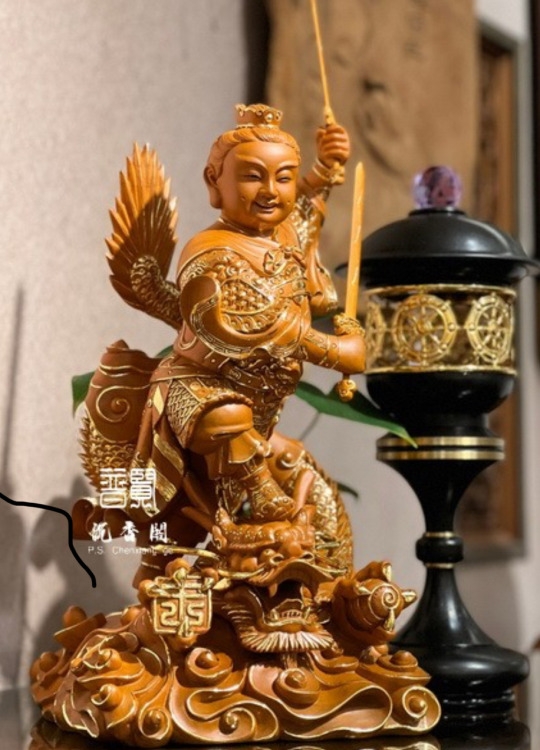

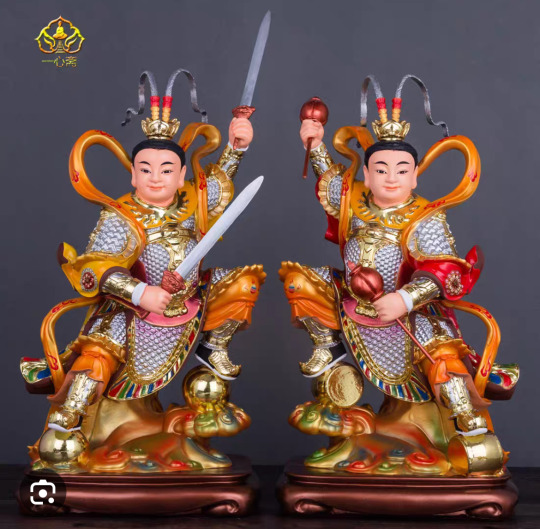
Ordinarily this wouldn’t be a problem, however Muzha is known primarily to use the Hooks of Wu and not melon hammers. Similarly, Jinzha is known to use a staff somewhat similar to Sun Wukong but is pictured to be using two swords. This may be a regional difference between China and Taiwan, but something for me to look into further nonetheless.
Images of idols of Nezha from Taiwan for reference (the first image is from Pilgrim Sun).

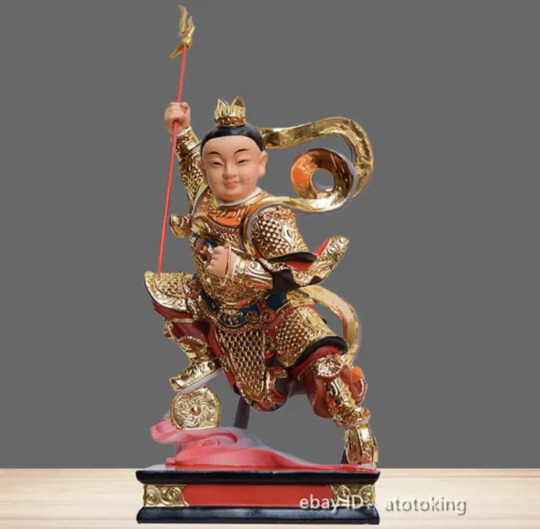
#nezha#li nezha#the legend of nezha#third lotus prince#li muzha#muzha#li jinzha#jinzha#wooden scholar#gold tactician#chinese religion#daoism#chinese gods#chinese deities#chinese mythology#chinese culture
56 notes
·
View notes
Text
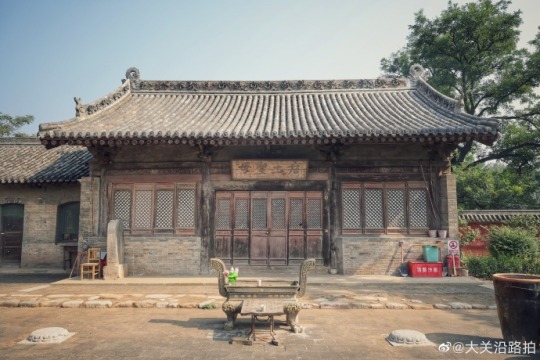
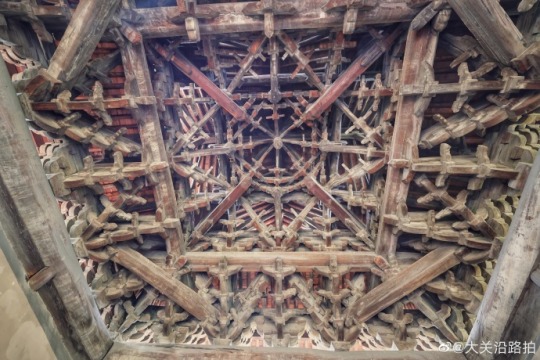
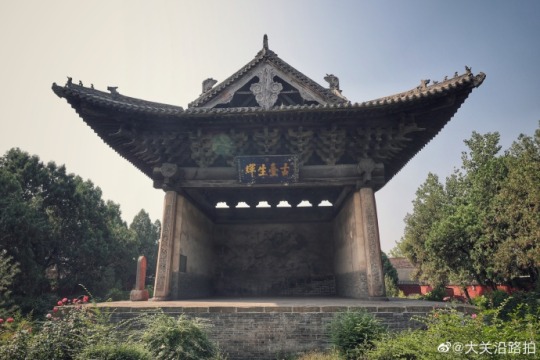
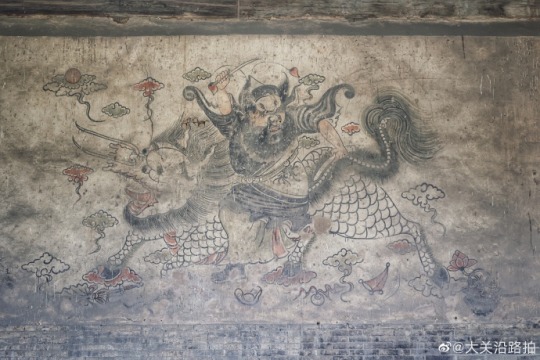
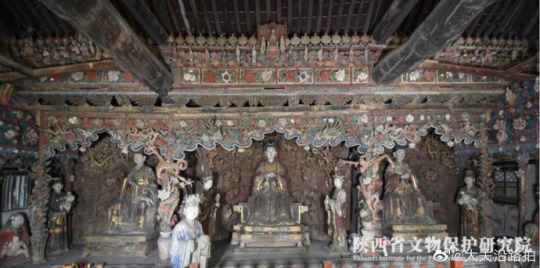
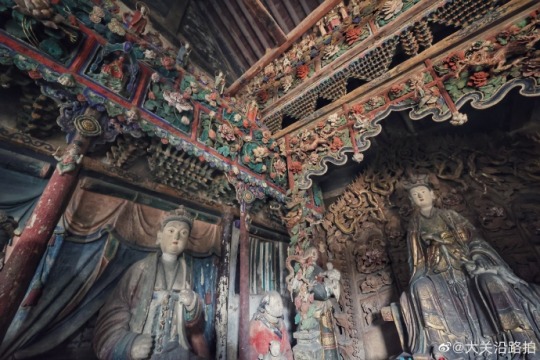

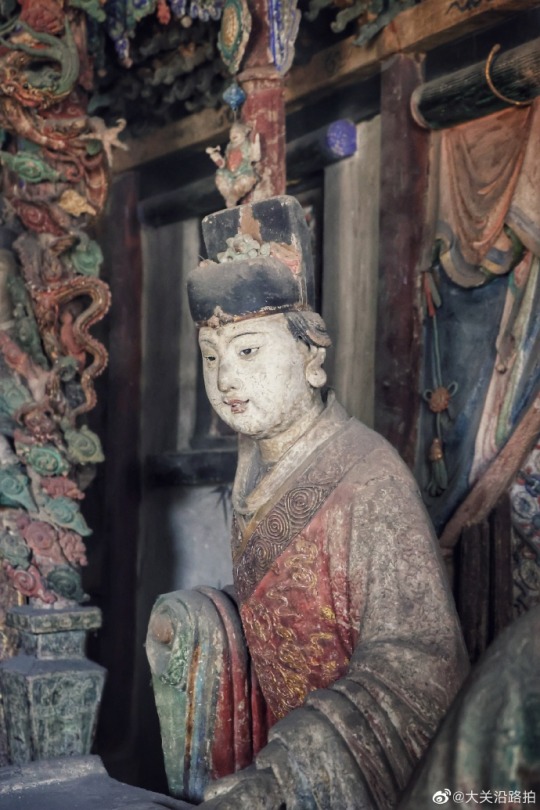
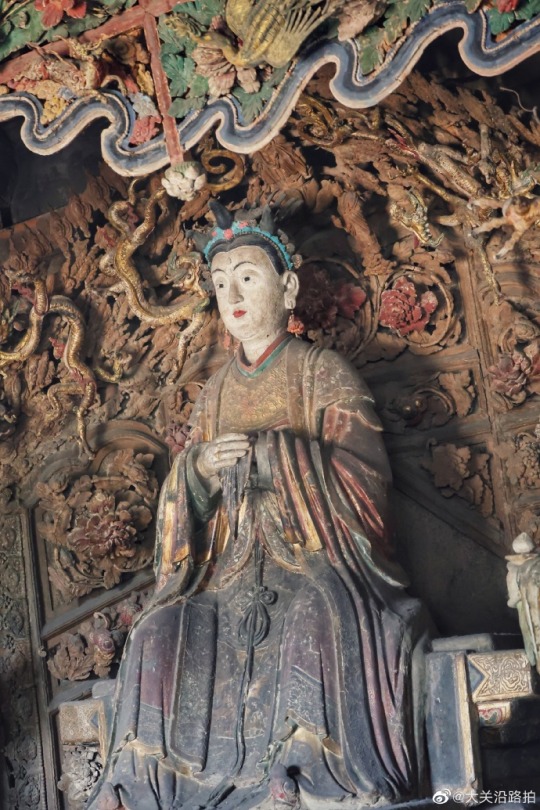
Rural Dongyang Houtu Temple From the Yuan Dynasty
Dongyang Houtu Temple (東羊后土廟), located in Dongyang village, Linfen (臨汾市), Shanxi. Built in the Yuan dynasty, in the fifth year of Zhizheng (至正) (1345). The remaining murals and architecture date from the Yuan dynasty, the altar figurines are from the Ming era.
The temple was erected to worship Houtu (后土神), the Queen of the Earth, ancient goddess of all lands and mountains.
It is curious that the sources of the Spring and Autumn period refer to Houtu as a male deity. Being incorporated into Taoism, Houtu retained his gender from the very beginning, worshipped as one of the Four Heavenly Ministers (四神).
However, he later fell victim to the widespread belief that the Earth represents the Yin principle, and therefore has feminine characteristics. This is how the image of the Lady Mother Earth (地母娘娘) from the late Taoism arose.
Photo: ©大关沿路拍
#ancient china#chinese culture#taoism#chinese art#chinese mythology#ming dynasty#chinese architecture#ming#yuan dynasty#wooden architecture#wooden buildings#chinese customs#taoist#chinese folk religion#Taoist temple#daoism#daoist#chinese temple#religious art#temple architecture#taoist deities#goddess#goddess worship#mother goddess#chinese folklore#后土 四神
156 notes
·
View notes
